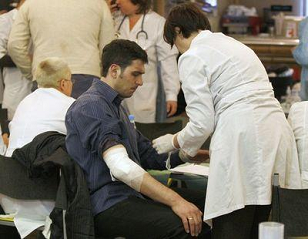War without end By Sergei Markedonov, special to Prague Watchdog
Moscow, Russia
There is currently an upsurge in the terrorist and sabotage activity of the North Caucasus Islamists. Unlike in previous years, this fact is now openly acknowledged by representatives of the Russian authorities. In his speech to the Federation Council on April 28 2010, Russia’s Prosecutor General Yuri Chaika announced an increase of approximately one third in the number of terrorist acts in the North Caucasus during the past year, and these are only the official figures, which the authorities traditionally tend to understate. We should note that Islamist terrorist acts are taking place in other regions of Russia besides the North Caucasus (in this regard, the May 1 attack in Nalchik fits into the trend outlined by the Prosecutor General). After a long pause, the blasts in the Moscow subway have finally brought the “rebel war” (myatezhevoina, a picturesque expression coined by a Russian military expert, Yevgeny Messner) to the Russian capital.
But do the Russian authorities and Russian society in general understand the nature of this threat, its dynamics, its resources (explicit and latent), the motivation of the insurgent leaders? To judge from the language being used by officials, experts and journalists to describe the challenge Russia faces in the North Caucasus, there is no such comprehension. While the officials characterize Umarov’s followers as “the gangster underground” (bandpodpol’ye), the name chosen by Russian media for the organizers of the ominous terrorist attacks of recent months is “Chechen separatists”.
Yet the insurgency’s chief ideologists and military leaders have almost nothing to do with separatism. This is evident even from a simple analysis of their names (Said Buryatsky, Anzor Astemirov, Mussa Mukozhev, and so on). Many of the more extreme jihadists have no connection with the Chechens, and state the reason for their actions as the defence of "pure Islam" far beyond the geographic boundaries of the Caucasus, not only on the anti-Russian front. Anti-Semitic and anti-Western rhetoric is an inherent element in the program of Doku Umarov and his followers.
The "Caucasus Emirate “ is largely a virtual structure. Not in the sense that its activists and supporters do not commit acts of terrorism and sabotage, but because it is not a single, centralized agency. Rather than being a fighting organization or social-revolutionary central committee, it represents a network in which even the horizontal mesh lacks rigidity. A community of this kind is united by shared ideological goals and real-life experience of a certain type. Consequently, there may be many cases where individual cells of the terrorist network undertake operations independently, without orders from their "emir".
Even the removal of the "Head Emir" or lesser "emirs" is not an irreversible disaster for the network (as the events of recent years have shown). However, in virtual space the "emir" takes responsibility for the attacks, creating the impression of a powerful underground state whose citizens are "welded by a single purpose and connected by a single goal". In reality this struggle has no united front. The insurgent groups are scattered and sparse, and this makes the task of combating them more complex than it would be in the case of the infrastructure of an unrecognized republic, which is easier to influence from outside and can be destroyed much more efficiently.
In this respect the Russian government and Russian society need to realize a few unpleasant truths. Firstly, the opponents of the government who are fighting for the "Emirate" have a strong ideological motivation. It will therefore be much harder to buy them off or de-propagandize them. So the propaganda will need to be aimed less at them than at the doubting or wavering population, which wavers for one simple reason – the lack of any positive policies on the part of the authorities, who see violent repression as a universal mechanism for solving a wide range of complex social problems. Secondly, in addition to its general lack of understanding of the nature of the North Caucasus threat, the present Russian government also lacks a coherent ideological motivation.
This repression is no substitute for ideology. In the1920s and1930s the Islamists and nationalists of the Caucasus and Central Asia were defeated less by the Cheka than by the superior ideological strength of the Bolsheviks and Young Communists, who thought not in terms of kickbacks, percentages and bribes, but of how to build a new society and a new man. Though I do not share the values of Communism, I cannot help noting that the builders of today’s Russian civil nation show not a hundredth part of that confidence in one’s own rightness, disinterestedness, openness and enthusiasm. On the contrary, there is a superfluity of cynicism and excessive prudence, which all too easily crush motivation of a non-material kind. If we are to overcome the temptations of radical Islamism we must confront it not only with police troops and special forces dispatched from Moscow, but with the ideologists of "Euro-Islam” (the officials would do well to devote some of their spare time to reading the brilliant works of Rafael Khakimov* on this subject) and the advocates of the "Russian nation”. Ideology can only be fought with ideology, just as efficacy of one engineering invention can only be defeated by the efficacy of another engineering discovery (though not a lingustic one, for example).
*State advisor on political issues to the President of the Republic of Tatarstan
Sergei Markedonov is a political analyst and associate professor at RGGU (Russian State University for the Humanities), Moscow
Photo: donbass.ua. (Translation by DM) © 2010 Prague Watchdog (see Reprint info). (P,DM)
DISCUSSION FORUM
|

